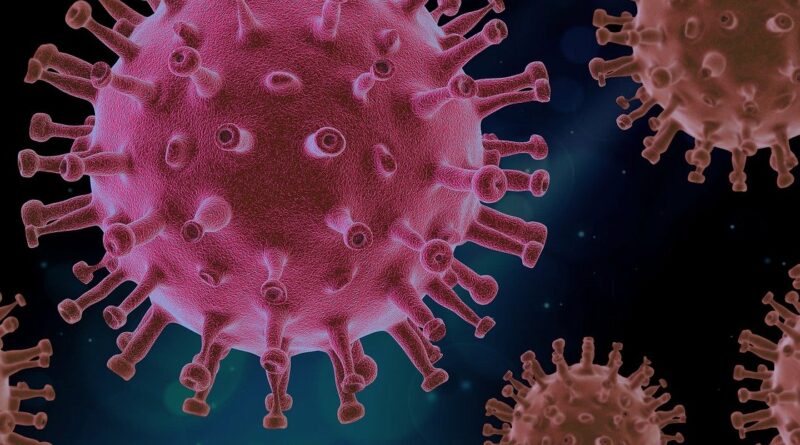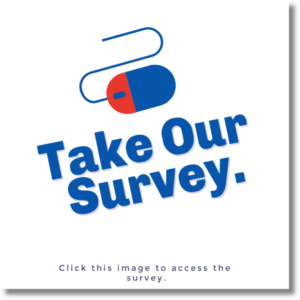Daily Case Counts Continue to Rise, Officials Warily Watch July 4 Weekend
After a new run of increasingly large numbers of positive cases attributed to Memorial Day weekend, health officials are warily watching to see what happens after the July 4th weekend. We have today’s bullet points for you:
- Daily case counts continue to rise, officials warily watch July 4 weekend;
- County and City ink deal to continue drive-through testing through July;
- Texas Workforce Commission postpones work-search requirement;
- State announces a $9 million project to improve COVID-19 infection control in nursing homes.
Daily Case Counts Continue to Rise, Officials Warily Watch July 4 Weekend
It was a deadly day for Dallas County Tuesday, with health officials reporting 20 new deaths attributed to COVID-19.
The county also reported 601 new positive cases, the highest recorded daily count since the first cases were diagnosed in March. Tuesday’s numbers bring the county’s total cumulative case count to 21,338, including 373 deaths.
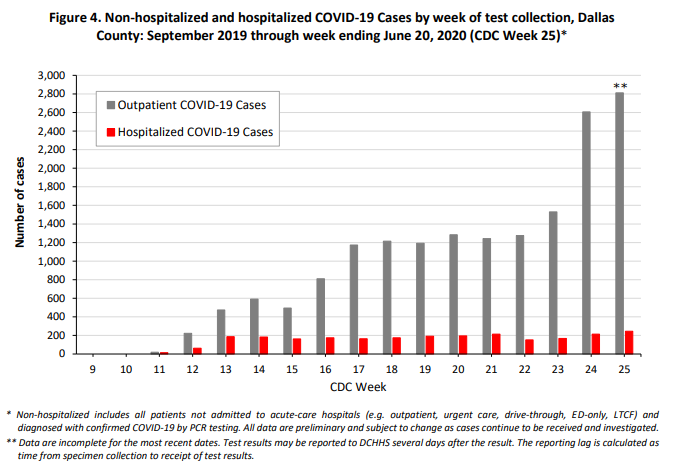
Among the dead was a Dallas man in his 30s who did not have any underlying high-risk health conditions. He was found dead at his home. Two Dallas men – one in his 40s and one in his 70s, both without high-risk health conditions – died in hospital emergency rooms.
A Richardson man in his 30s, a Dallas man in his 40s, an Irving man in his 40s, a Balch Springs man in his 50s, a Dallas woman in her 60s, a Dallas man in his 60s, a Dallas woman in her 70s, two Dallas woman in their 80s, and a Dallas man in his 80s also died, all with underlying high-risk health conditions.
Additionally, two Dallas men in their 70s with underlying health conditions died in Dallas emergency rooms, and one Garland woman in her 70s with underlying conditions was found dead at her home.
Long-term care facilities continue to account for about a third of all COVID-19 deaths. A man in his 50s who lived at a Seagoville facility, a woman in her 60s who lived in a Garland facility, and two women in their 90s who lived in Dallas facilities, were among the COVID-19 victims Tuesday.

“Today we’ve surpassed 600 new cases of COVID-19 for the first time, having surpassed 300 cases only 20 days ago. Additionally, this is our deadliest day thus far in the outbreak. Twenty residents are being reported as COVID-19 casualties today, exceeding our previous high of 16 deaths,” said Dallas County Judge Clay Jenkins. “Finally, our hospitalization numbers continue to increase. Local COVID-19 hospitalizations yesterday were at an all-time high of 619 compared to 296 30 days ago. And regionally, yesterday was an all-time high of 1340 compared to 615 30 days ago.”

The county said that the average number of COVID-19 hospitalizations, which had been around 300-350 for several weeks, hit 619 as of June 29. Emergency room visits also continued to increase, representing about 32% of all ER visits for a 24-hour period ending June 29, according to information reported to the North Central Texas Trauma Regional Advisory Council.

Of cases requiring hospitalization, more than two-thirds have been under 65 years of age, and about half do not have high-risk chronic health conditions. Diabetes has been an underlying high-risk health condition reported in about a third of all hospitalized patients with COVID-19.
Dallas Mayor Eric Johnson said that 25 Dallas hospitals reported their bed availability Tuesday. Of the 6,083 total beds, 68% were occupied. Of the 944 ICU beds available, 71% were occupied. There were 959 ventilators available, with 352 in use.
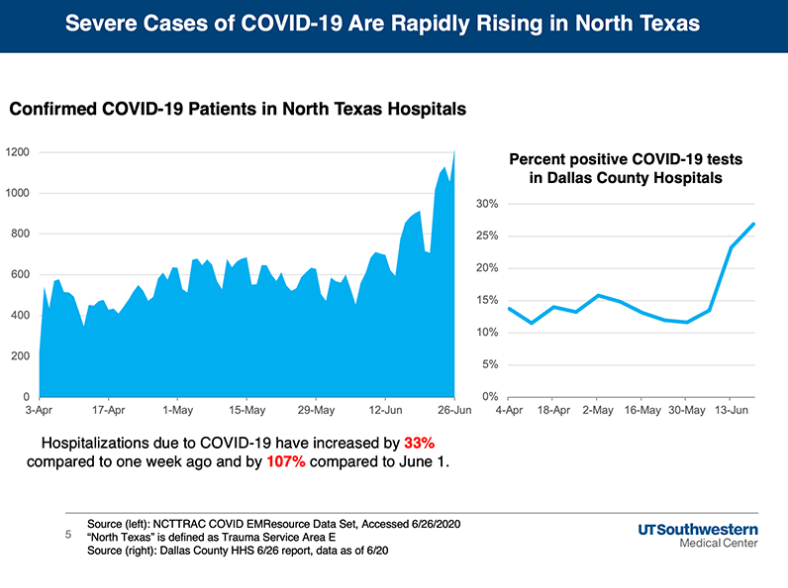
UT Southwestern’s latest forecast projects an increase of 50% in hospitalizations by July 9. Currently, hospitalizations are up 33% from last week and 107% compared to June 1.
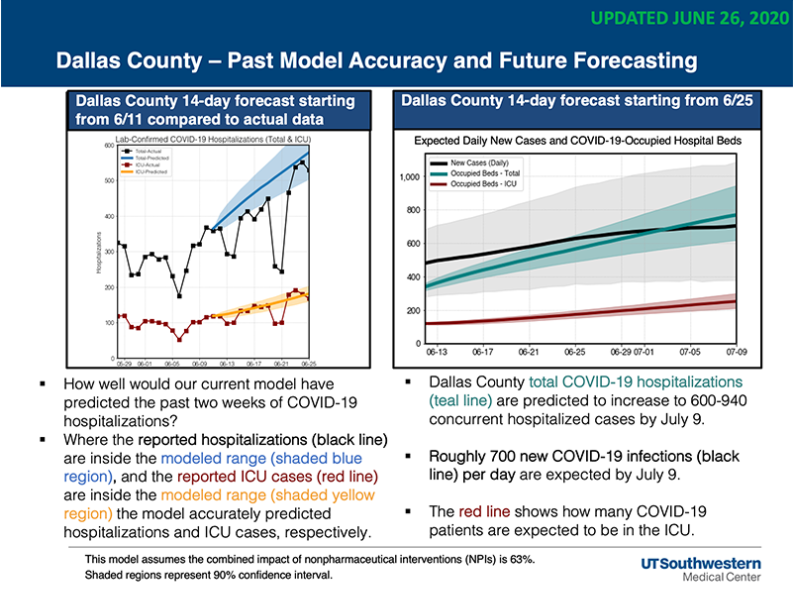
By July 9, Dallas County hospitals could see concurrent hospitalizations from COVID-19 increase to between 600 and 940 cases, the forecast said. It also predicted that cases would average 700 per day by July 9.
Whether the cases precipitously rise in the next few weeks may depend on behaviors during the July 4 weekend, the forecast said.
“Great caution must be exercised now and during any Independence Day celebrations so that our current increases do not turn into exponential case growth,” the forecast said. “Any bump from the July 4th holiday or a decrease in compliance of the physical distancing, masking, hand hygiene, and crowd management policies could leave many Dallas County hospitals with capacity changes mid-July.”
“Great caution must be exercised now and during any Independence Day celebrations so that our current increases do not turn into exponential case growth.”
UT Southwestern
In the county’s June 30 aggregate report, most cases continue to be between the ages of 18 and 60, with the 18-40 age group accounting for 45% of the cases, and the 41-64 age group accounting for another 36% of the total cases.
Close contact or community transmission continues to be the biggest risk factor for contracting COVID-19, accounting for roughly 91% of all cases. Living in a long-term care facility and being incarcerated in the county jail are a distant second, and third, at 3.2% and 2.5%, respectively.
About 83% of all hospitalizations are critical infrastructure workers. Food and agriculture workers account for 17% of all those cases – which include restaurant and grocery store workers. Healthcare workers and transportation workers account for 13% of those cases.
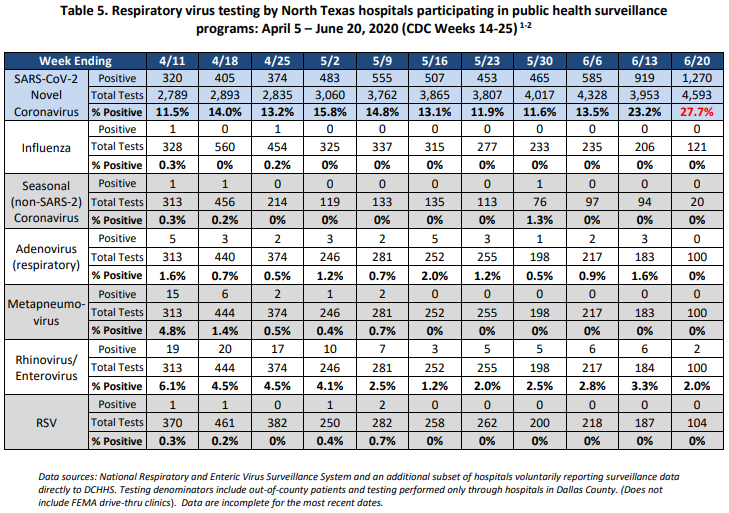
Of the testing done, positive cases accounted for 27.7% as of June 20, with 1,270 positives coming from 4,593 tests. Testing and positive test results of COVID-19 far outpaces any other respiratory virus – even if you combine them all.
Thirteen percent of all cases ended up hospitalized – 27% ended up in intensive care, and 16% ended up on a ventilator.
In a city-by-city breakdown, Dallas still comes in with the highest number of cases – 11,919, or 55.9%. Highland Park has 21 cases so far, and University Park has 38.
Statewide, 1,869,282 tests have been administered, with 159,986 testing positive in 244 counties, and 2,424 deaths so far.
County, City Ink Deal to Continue Drive-Through Testing Through July
The city of Dallas and Dallas County finalized a contract with Honu, a testing vendor, that will allow drive-through COVID-19 testing to continue past June.
The American Airlines Center testing site has now closed, but the Ellis Davis Field House location will continue federally supported testing through mid-July before transitioning to vendor operations once the federal support ends. A new testing site at the University of Dallas in Irving opens today.
“We are moving the AAC drive-thru site to the University of Dallas on Wednesday. Dallas County Health and Human Services will supervise a private vendor with a new lab so the turnaround for results should be faster,” said Jenkins. “Faster results give you the chance to make the best decisions for your health and gives our public health experts more timely information to better advise the community.”
The Ellis Davis Field House site will remain a regional site with no geographic boundaries for those being tested while it remains under federal support. The testing site at the University of Dallas will only be open to City of Dallas and Dallas County residents. Address verification, such as a utility bill or library card is required.
“COVID-19 has been spreading rapidly in our community, and testing is a critical part of our response efforts,” Mayor Eric Johnson said. “This contract and transition plan will ensure that our residents continue to have access to testing. In addition, I also urge our residents to help stop this outbreak by taking hygiene seriously, practicing social distancing, and wearing masks when coming into contact with others.”
Testing hours and criteria will remain the same. Both locations will be open Monday to Saturday, from 8 a.m. to 5 p.m. each day.
Locations:
Ellis Davis Field House, 9191 S Polk St., Dallas, Texas
University of Dallas, 1845 E Northgate Dr., Lot B; Irving, Texas
Criteria for the testing sites are as follows:
- Persons with symptoms of potential COVID-19 infection, including: fever, cough, shortness of breath, chills, muscle pain, new loss of taste or smell, vomiting or diarrhea, and/or sore throat; OR
- Anyone 65-years-old or older; OR
- Anyone with chronic health issues (diabetes, asthma, heart issues, etc.); OR
- Any first responders, DART drivers, healthcare workers, grocery store and essential retail store workers; OR
- Persons without symptoms who have been actively engaged in large group settings, such as public gatherings or congregations of people.
At home mobile testing and neighborhood walk-up testing sites are also available for City of Dallas and Dallas County residents. To view additional testing locations visit www.dallascityhall.com/covid19 or https://www.dallascounty.org/covid-19/testing-locations.php.
Texas Workforce Commission Postpones Work-Search Requirement

The Texas Workforce Commission Tuesday announced it would postpone reinstating work-search requirements for unemployed Texans that are receiving unemployment benefits.
If the suspension of the requirement had expired, it would have required those who have filed for unemployment benefits to prove they were searching for work.
In a press release, the agency said that the increasing case numbers spurred the decision to postpone, as well as Gov. Greg Abbott’s order to scale back some businesses last week.
“Due to the resurgence of COVID-19 cases in Texas, TWC has decided to pause the return of work search requirements at this time,” TWC executive director Ed Serna said. “We will continue to monitor the situation and make further recommendations in late July.
“From the outset, TWC has stated that bringing back work search would be conditions-based.”
State Announces $9 Million Project to Improve COVID-19 Infection Control in Nursing Homes
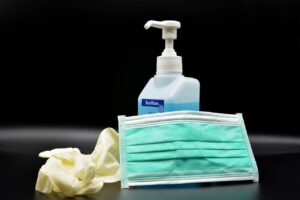
Abbott and the Texas Health and Human Services Commission Tuesday announced $9 million in federal funding for nursing facilities to implement infection control projects to protect residents and staff from the spread of COVID-19. Starting July 1, nursing facility providers in Texas are encouraged to submit applications to HHSC to receive this federal funding.
“We know that older Texans are more susceptible to COVID-19, and Texas is committed to ensuring that nursing facilities have the tools they need to keep their residents and staff safe,” said Abbott. “The resources available through this federal funding will help maintain infection control within these facilities. We must continue to protect our most vulnerable populations, mitigate the spread of COVID-19 in Texas, and protect public health.”
“Nursing facilities have this opportunity to apply for funding to enhance health and safety protections for the people they serve,” said David Kostroun, deputy executive commissioner for HHSC’s Regulatory Services Division. “During this unprecedented time, we are directing providers to pursue every avenue to mitigate the spread of this virus.”
Approved providers will be eligible to receive funds for infection control resources, including:
- Thermometers and temperature scanning equipment for staff and residents
- Decontamination and disinfecting systems
- Plexiglass barriers or portable walls to ensure social distancing and droplet protection
- N95 fit-test equipment
- Microbe-resistant flooring and wall coverings
For more details on how to apply, visit the Texas HHS website. The deadline for applications is August 30.
HHSC is continuing to accept applications for communication technology in nursing facilities, which are eligible to receive up to $3,000 per facility to purchase devices (e.g. iPads, tablets, webcams) and accessories (e.g. headphones, protective covers).

